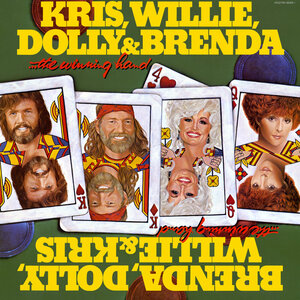
The Winning Hand is a collaborative compilation album by Kris Kristofferson, Willie Nelson, Dolly Parton and Brenda Lee. It was released on November 1, 1982, by Monument Records. The album was produced by Fred Foster, founder and chairman of the board of Monument, and contains some newly-recorded material as well as catalog material with new instrumental tracks. The album spawned two singles, the Parton and Nelson duet "Everything's Beautiful " and "You're Gonna Love Yourself in the Morning" by Lee and Nelson. The album also inspired a television special of the same name hosted by Johnny Cash, who had written the album's liner notes. The special featuring all four performers aired in over 150 markets in March and April 1985.

Coat of Many Colors is the eighth solo studio album by American singer-songwriter Dolly Parton. It was released on October 4, 1971, by RCA Victor. The album was nominated for Album of the Year at the 1972 CMA Awards. It also appeared on Time magazine's list of the 100 Greatest Albums of All Time and at No. 257 on Rolling Stone's 2020 list of the 500 Greatest Albums of All Time. Parton has cited the title track on numerous occasions as her personal favorite of all the songs she has written.

All I Can Do is the seventeenth solo studio album by American singer-songwriter Dolly Parton. It was released on August 16, 1976, by RCA Victor. The album was co-produced by Parton and Porter Wagoner and would be the last of Parton's solo albums to have any involvement from Wagoner. It was nominated for Best Country Vocal Performance, Female at the 19th Annual Grammy Awards. The album spawned three singles: "Hey, Lucky Lady", "All I Can Do", and "Shattered Image".

Dolly is the sixteenth solo studio album by American entertainer Dolly Parton. It was released on September 15, 1975, by RCA Victor. To differentiate it from Parton's 2009 4-disc, career-spanning box set, which is also titled Dolly, the album is sometimes referred to as Dolly: The Seeker – We Used To.

The Best of Dolly Parton is a compilation album by American singer-songwriter Dolly Parton. It was released on November 9, 1970, by RCA Victor. The album was produced by Bob Ferguson. It includes some of Parton's early hits, a few non-single album tracks, and two previously unreleased tracks. The album peaked at number 12 on the Billboard Top Country Albums chart. The single, "Mule Skinner Blues " peaked at number three on the Billboard Hot Country Songs chart and earned Parton a nomination for Best Female Country Vocal Performance at the 13th Annual Grammy Awards. The album was certified Gold by the RIAA on June 12, 1978, for sales of 500,000 copies.
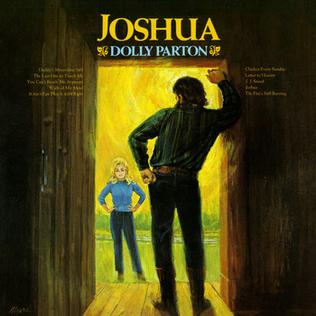
Joshua is the seventh solo studio album by American singer-songwriter Dolly Parton. It was released on April 12, 1971, by RCA Victor. The album was produced by Bob Ferguson. It peaked at number 16 on the Billboard Top Country Albums chart and number 198 on the Billboard 200 chart. The album's single, "Joshua", was nominated for a Grammy and was Parton's first song to reach number one on the Billboard Hot Country Songs chart.

Hello, I'm Dolly is the debut studio album by American singer-songwriter Dolly Parton. It was released on September 18, 1967, by Monument Records. The album was produced by Fred Foster. It peaked at number 11 on the Billboard Top Country Albums chart. The album spawned two top 40 hits, "Dumb Blonde" and "Something Fishy", which peaked at numbers 24 and 17, respectively.

Just the Two of Us is the second collaborative studio album by Porter Wagoner and Dolly Parton. It was released on September 9, 1968, by RCA Victor. The album was produced by Bob Ferguson. It peaked at number five on the Billboard Top Country Albums chart and number 184 on the Billboard 200 chart. The album spawned three singles. "Holding on to Nothin'" and "We'll Get Ahead Someday" were top ten hits on the Billboard Hot Country Songs chart, peaking at numbers seven and five, respectively. The third single, "Jeannie's Afraid of the Dark", peaked at number 51.

Just Because I'm a Woman is the second solo studio album by American singer-songwriter Dolly Parton. It was released on April 15, 1968, by RCA Victor. The album was produced by Bob Ferguson. It peaked at number 22 on the Billboard Top Country Albums chart. The album's title track was the only single released and it peaked at number 17 on the Billboard Hot Country Singles chart.

In the Good Old Days (When Times Were Bad) is the third solo studio album by American singer-songwriter Dolly Parton. It was released on February 3, 1969, by RCA Victor. The album was produced by Bob Ferguson. It peaked at number 15 on the Billboard Top Country Albums chart. The album's title track was the only single released and it peaked at number 25 on the Billboard Hot Country Songs chart.
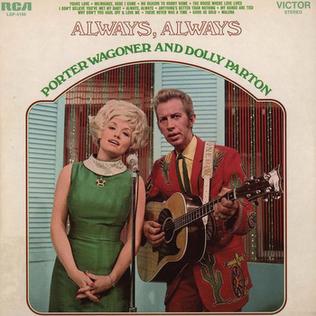
Always, Always is the third collaborative studio album by Porter Wagoner and Dolly Parton. It was released on June 30, 1969, by RCA Victor. The album was produced by Bob Ferguson. It peaked at number five on the Billboard Top Country Albums chart and number 162 on the Billboard 200 chart. "Yours Love" and the album's title track were released as singles, peaking at numbers nine and 16, respectively.

The Fairest of Them All is the fifth solo studio album by American singer-songwriter Dolly Parton. It was released on February 2, 1970, by RCA Victor. The album was produced by Bob Ferguson. It was the first of Parton's albums on which she wrote the majority of the songs. The Fairest of Them All peaked at number 13 on the Billboard Top Country Albums chart. The album's only single, "Daddy Come and Get Me", peaked at number 40 on the Billboard Hot Country Songs chart.

A Real Live Dolly is the first live album by American singer-songwriter Dolly Parton. It was released on June 29, 1970, by RCA Victor. The album was produced by Bob Ferguson and was recorded on April 15, 1970, at Sevier County High School in Sevierville, Tennessee. It peaked at number 32 on the Billboard Top Country Albums chart and number 154 on the Billboard 200 chart.

Porter Wayne and Dolly Rebecca is the fourth collaborative studio album by Porter Wagoner and Dolly Parton. It was released on March 9, 1970, by RCA Victor. The album was produced by Bob Ferguson. It peaked at number four on the Billboard Top Country Albums chart and number 137 on the Billboard 200 chart. Two top ten singles were released from the album, "Just Someone I Used to Know" and "Tomorrow Is Forever", peaking at numbers five and nine, respectively. "Just Someone I Used to Know" was nominated for Best Country Performance by a Duo or Group at the 12th Annual Grammy Awards.

Once More is the fifth collaborative studio album by Porter Wagoner and Dolly Parton. It was released on August 3, 1970, by RCA Victor. The album was produced by Bob Ferguson. It peaked at number 7 on the Billboard Top Country Albums chart and number 191 on the Billboard 200 chart. The album's single, "Daddy Was an Old Time Preacher Man", peaked at number 7 on the Billboard Hot Country Songs chart and was nominated for Best Country Performance by a Duo or Group at the 13th Annual Grammy Awards.
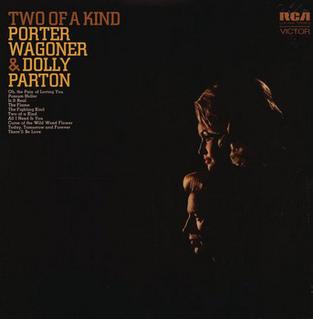
Two of a Kind is the sixth collaborative studio album by Porter Wagoner and Dolly Parton. It was released on February 8, 1971, by RCA Victor. The album was produced by Bob Ferguson. It peaked at number 13 on the Billboard Top Country Albums chart and number 142 on the Billboard 200 chart. No singles were released from the album, but "Oh, the Pain of Loving You" was included as the B-side of the 1971 single "The Right Combination".
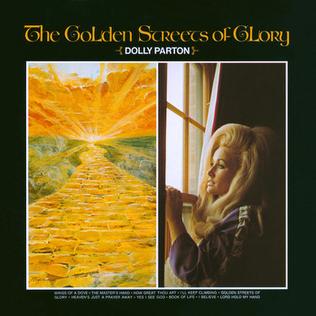
The Golden Streets of Glory is the sixth solo studio album by American singer-songwriter Dolly Parton. It was released on February 15, 1971, by RCA Victor. The album was produced by Bob Ferguson. It peaked at number 22 on the Billboard Top Country Albums chart. No singles were released from the album, but the title track was released as the B-side of the religious single "Comin' for to Carry Me Home" in May 1971. The album was nominated for Best Sacred Performance at the 14th Annual Grammy Awards. The album's liner notes were written by Parton's maternal grandfather, Rev. Jake Owens.

The Best of Porter Wagoner & Dolly Parton is a compilation album by Porter Wagoner and Dolly Parton. It was released on July 19, 1971, by RCA Victor. The album contains tracks from each of their collaboration albums released up to that point, with the exception of 1969's Always, Always. The album included one previously unreleased track, the Grammy-nominated single, "Better Move It on Home".

The Right Combination • Burning the Midnight Oil is the seventh collaborative studio album by Porter Wagoner and Dolly Parton. It was released on January 3, 1972, by RCA Victor.
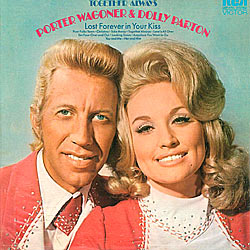
Together Always is the eighth collaborative studio album by Porter Wagoner and Dolly Parton. It was released on September 11, 1972, by RCA Victor.




















